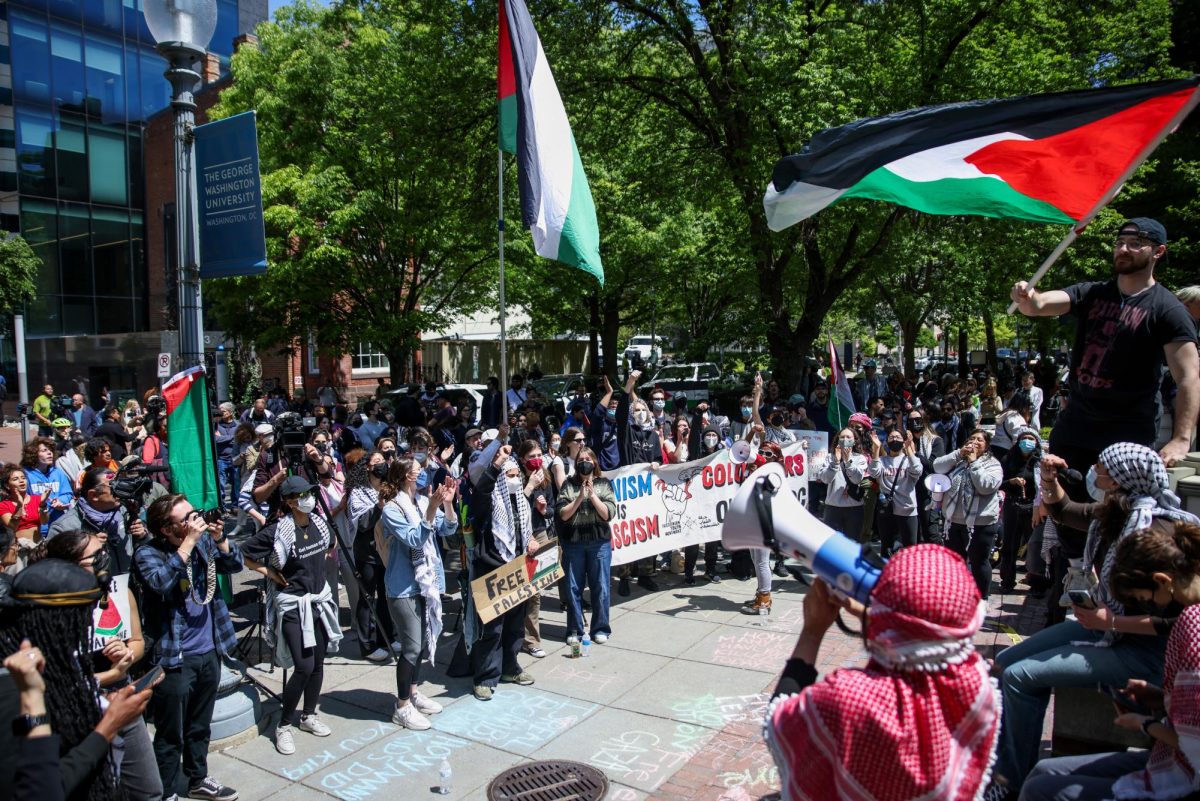In an event billed as unprecedented for two cabinet secretaries, Secretary of State Hillary Clinton and Secretary of Defense Robert Gates discussed a wide range of international affairs issues in Lisner Auditorium Monday night, from a possible troop surge in Afghanistan to Iran’s nuclear programs and human rights violations.
Tickets for the event sold out in fewer than 30 minutes after dozens camped out overnight last week, leaving Lisner Auditorium packed with students, GW faculty and staff and members of the media on Monday night. In the 90-minute interview moderated by Christiane Amanpour, CNN’s chief international correspondent, and Frank Sesno, the director of the School of Media and Public Affairs, Clinton and Gates focused on the situation in the Middle East – including Afghanistan, Pakistan and Iran.
Both secretaries agreed that Iran’s nuclear intentions were unclear, but that the U.S. was working to convince Iran that pursuing a nuclear weapon was not in the country’s best interest because of sanctions and security reasons.
“We have a very clear objective of trying to persuade the Iranians that their calculation of their security
interest and their economic interest should take into account the consequences of sanctions, for example, of increased defensive measures taken in Europe and in the Gulf region,” Clinton said.
Sesno asked Clinton to address concerns that the effort to negotiate with Iran’s government on nuclear issues will cause Iranian citizens vying for political change to be “somehow forgotten or abandoned.”
“No,” Clinton said. “Because I think we’ve been very clear in supporting the legitimate aspirations of the Iranian people and in speaking out forcefully against the irregularities of their electoral process.” She added, “These are not either or [situations.] Human rights are at the core of who we are as Americans.”
Gates said he and Clinton work closely together and displayed a familiarity with each other’s personalities throughout the interview, with Clinton referring to Gates as “Bob” on several occasions.
“You know, most of my career, the Secretary of the State and Defense weren’t speaking to one another and it could get pretty ugly, actually,” Gates said. “And so it’s terrific to have the kind of relationship where we can talk together.”
Both secretaries said the Obama administration’s goal remained the same: “disrupt, dismantle and defeat al-Qaeda.” But Clinton said there are White House discussions that are always revisiting the best way to achieve those goals, including increasing civilian and military presence in Afghanistan.
Gates said pulling out of Afghanistan was not an option for the U.S. and said a defeat in the region would empower al-Qaeda’s message, help them recruit new members and improve the extremist group’s fundraising ability. Several issues, including “clearly a flawed election” in Afghanistan, complicate the decision to possibly send more troops, but President Barack Obama’s decisions on the issue will be “among the most important he will make in his presidency,” Gates said.
Convincing Pakistan that the U.S. will continue to fight terrorism at the “modern epicenter of jihad” – the Afghan-Pakistan border – is crucial to success in the region, Gates added.
“We are not leaving Afghanistan,” Gates said. “There should be no uncertainty in terms of our determination to remain in Afghanistan and to continue to build a relationship of partnership and trust with the Pakistanis. That’s long term. That’s a strategic objective of the United States.”
After Amanpour played a clip of General Stanley McChrystal, the top U.S. commander in Afghanistan, saying the Taliban was gaining momentum in the region, Gates agreed with the commander and said a troop shortage was to blame.
“I can’t improve on General McChrystal’s assessment that the situation in Afghanistan is serious and deteriorating,” Gates said. “The reality is that, because of our inability and the inability, frankly, of our allies to put enough troops into Afghanistan, the Taliban do have the momentum right now, it seems.”
On a number of occasions, Clinton and Gates said their advice would be made to the president “candidly but privately” and indicated a joint belief that McChrystal’s remarks should not have been made publicly.
The secretaries’ comments prompted Sesno to ask pointedly, “Are you trying to muzzle McChrystal?” Both Clinton and Gates answered no.
“It is unusual for all advice about military matters to be in public for a president,” Clinton said. “Now, there is a lot of second-guessing that might go on and historical perspective, but this process that President Obama has put together is, I think, one of the most open, most thorough that I’ve read about.”
After three student questions and the taped portion of the interview concluded, Sesno asked the secretaries to tell the audience about working in public service.
“Well Bob has been doing this for much longer than I have. And he got to do a lot of it in secret, and I have no secrets,” Clinton said, no doubt referencing Gates’ time at the CIA, to laughter from the audience. “But we really believe in what we do at the State Department – and we’re hiring.”







